South America Newsletter August 2024
Dear Friends,
This month we bring you news from Colombia, Argentina, Peru, Paraguay, Venezuela, Chile, Ecuador and Brazil.
Highlights are:
- Colombia and others: Amnesty has a new petition directed at governments to support a Torture-free Trade treaty.
- Argentina: An Urgent Action demands that charges against 33 people opposed the controversial ‘ley de bases’ be dropped.
- Argentina: A second Urgent Action demands that charges against Pierina Nochetti for painting graffiti be dropped.
- Peru: A new report with an Urgent Action identifies the former President’s responsibility for the killings and injuries in last year’s protests.
- Paraguay: Amnesty has issued an Urgent Action calling on the Chamber of Deputies to reject a bill limiting freedom of assembly..
- Venezuela: following the controversial re-election of President Maduro, Amnesty is calling on a commitment to human rights and the release of three political prisoners.
- Chile: Amnesty is calling on the government to decriminalize voluntary abortion in all circumstances.
- Ecuador: Human Rights Watch have released a new report calling on the Ecuadorian Government to accelerate measures to end sexual violence in schools.
- Brazil: Amnesty is denouncing the dropping of charges against 3 policemen accused of murder of a child.
COLOMBIA
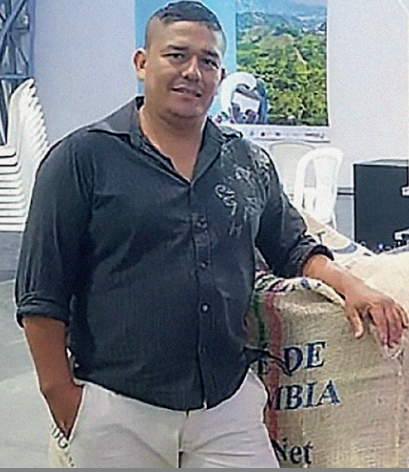
Carlos Alberto Romero Martínez, legal representative of a small holders´ association, killed 16 December 2023 in Caldas, Antioquia by persons unknown.
Amnesty International has launched a campaign to demand that governments support a Torture-Free Trade Treaty to regulate the trade in policing equipment to ensure it does not end in the hands of abusive police forces. They cite the excessive use of violence using non-lethal weapons by Colombia’s police in response to the National Strike in 2018. Please sign the petition, which for UK residents will be redirected to the British government. Accompanying this demand is the first hand account by Leidy Cadena, the first person to be blinded by police in 2018, who has been forced to leave Colombia.
The Washington based human right advocacy group WOLA condemns the ‘vile attack’ on indigenous Wayuu leader Javier Rojas Uriana 2 July. They demand that the Colombian authorities and the National Protection Unit guarantee the protection of Mr. Rojas Uriana, his family, and the Association of Shipia Wayuu members. ‘They should guarantee that these crimes’ intellectual and material authors are brought to justice. Additionally, these entities should investigate why the regional prosecutor’s office of Cesar and the SIJIN have refused to accept the complaint the victim tried to file.’
Leaders of dissident FARC guerrillas known as the EMC, who were travelling in armoured cars provided by the National Protection Unit, were arrested at a military checkpoint in Cisneros. They were on their way to peace talks. Seven remain in custody. The EMC has been blamed for a series of bombings and shootings around Cali and they threatened to disrupt the COP 16 negotiations which are due to begin in Cali in October. They have since withdrawn this threat and have called for the arrest warrants to be revoked.
Peace Brigade International Colombia’s annual report records the NGO’s invaluable role in protecting communities at risk in Colombia. This includes the presence of 26 field volunteers, some of whom protect Amnesty’s IAR Casefile Peace Community of San José de Apartadó. The report includes the testimony of one field worker in the country. They note that ‘Even though violence and human rights violations decreased slightly in 2023 according to figures from Indepaz, there were still 188 murders of human rights leaders and defenders, 94 massacres with 303 victims and 167,540 victims of forced displacement.’
Justice for Colombia summarises how the Petro government’s reforms on healthcare, labour, pensions and education are faring. The Historic Pact Bloc of deputies which support the government are in a minority in Congress and they must negotiate every reform with other parties. While the pensions reform has been approved in full, the government had to accept amendments to labour reform which weakened workers’ rights. The reform on healthcare failed to pass while the government pulled education after it was opposed by the Federation of Colombian Educators.
The UN’s Working Group on Business and Human Rights is on its first visit to Colombia. They will examine the effort of the Colombian government and businesses to implement their human rights responsibilities under the UN Guiding Principles on Business and Human Rights. They will report to the Human Rights Council in June 2025. Many businesses, particularly in resource extraction such as mining and oil, are accused of ignoring the rights of local communities who may suffer from a degraded environment, air and water contamination and economic deprivation as a direct result of their presence.
ARGENTINA
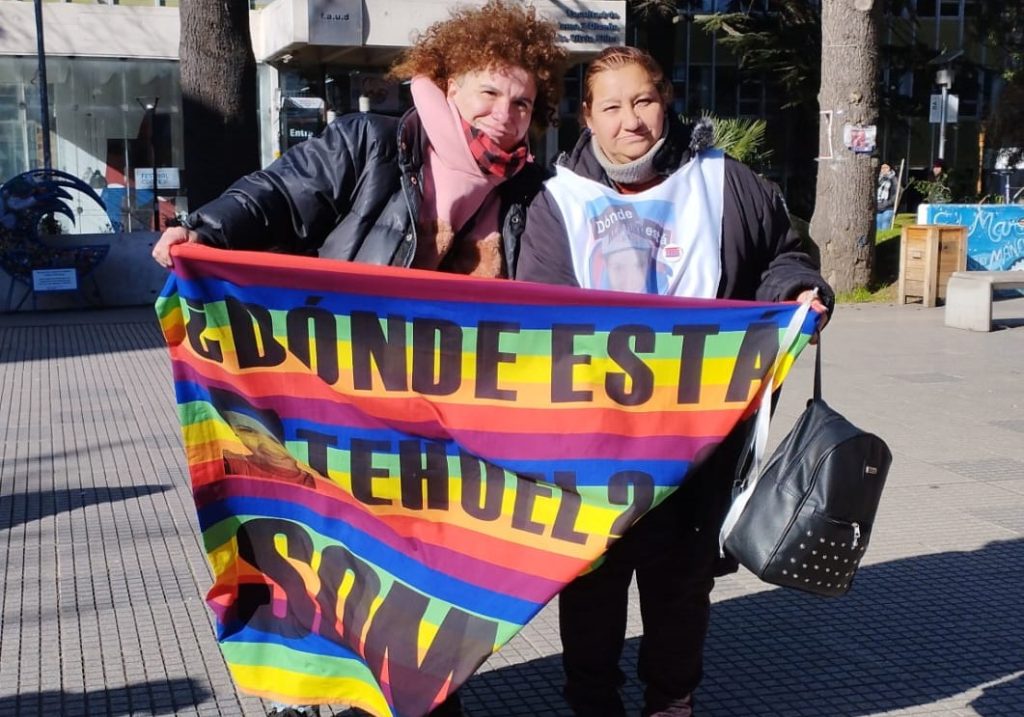
Pierina Nochettiwith Norma Nahuelcura, mother of Tehuel de la Torre.
In the June newsletter there was an Urgent Action aimed at Senators, urging them not to remove the “pension moratorium”. This had been drafted into the “Ley de Bases” bill that was being debated in National Congress. If the “pension moratorium” were eliminated, 90% of women and 70% percent of men would not be able to retire at the age of 60 or 65. “Ley de Bases” was approved, but the articles that threatened the right to social security and an adequate standard of living for older people were removed; the “pension moratorium” remains in place. Thank you to everyone who took action.
There were many peaceful demonstrations against the “Ley de Bases”. In June, 33 people were arbitrarily detained and charged with several offences, including attacks on constitutional order and democratic life. Some of those charged were detained travelling to or away from the demonstrations. There is evidence that the police operation included the unlawful use of “less lethal” weapons, such as chemical irritants and rubber bullets. Amnesty International has an Urgent Action urging the prosecutor to immediately drop the charges against them.
In the city of Necochea, Pierina Nochetti is accused of painting graffiti with the question “Where is Tehuel?” Over the past few weeks one of the two men accused of murdering Tehuel de la Torre has been on trial. Tehuel’s body has never been found; Luis Alberto Ramos – the last person to see him – is accused of “qualified homicide due to hatred of gender identity” There has been ongoing campaigning by the LGTBI community since Teheul disappeared in March 2021. The charges against Pierina arose after Necochea Pride in 2022. The Urgent Action calls for these charges to be dropped.
Amnesty International has reiterated its objection to the proposal that two male candidates join the Supreme Court (already all men). Amnesty International presented a series of questions and observations to the Upper House regarding the candidates to fill the vacancies in the highest court. A previous letter argued that the nomination of the two male candidates constitutes discriminatory action and represents a strong setback in terms of gender parity, human rights, quality and legitimacy of the judicial system.
PERU
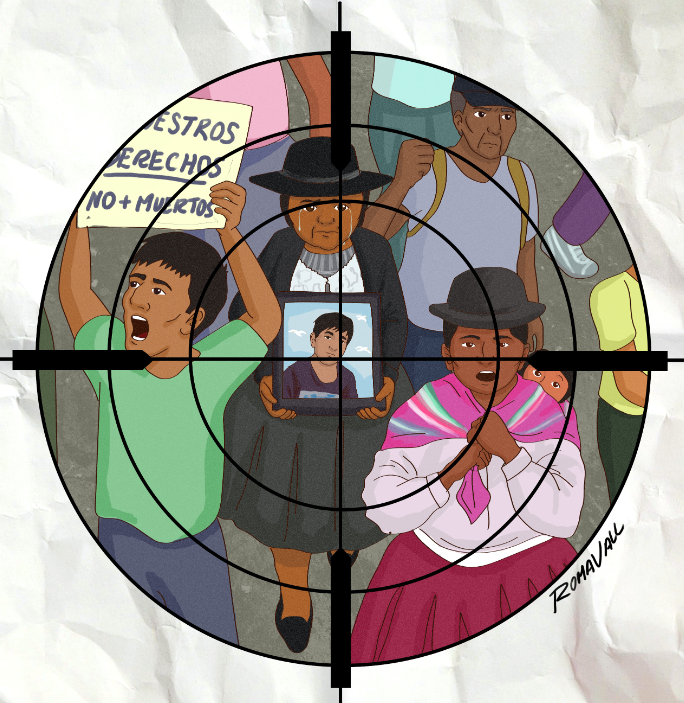
Who Called The Shots?
Amnesty has launched a new report, Who Called the Shots? Chain of Command Responsibility for Killings and Injuries in Protests in Peru, into responsibility for one of the gravest episodes of widespread human rights violations in Peru’s recent history, when 50 civilians and one policeman were killed and over 1,400 injured during protests between December 2022 and March 2023. The report identifies key decisions made by President Boluarte,in her capacity as commander-in-chief of Peru’s armed forces and police, that merit prosecutors evaluating her individual criminal responsibility in their investigations. You can still sign the petition here.
PARAGUAY
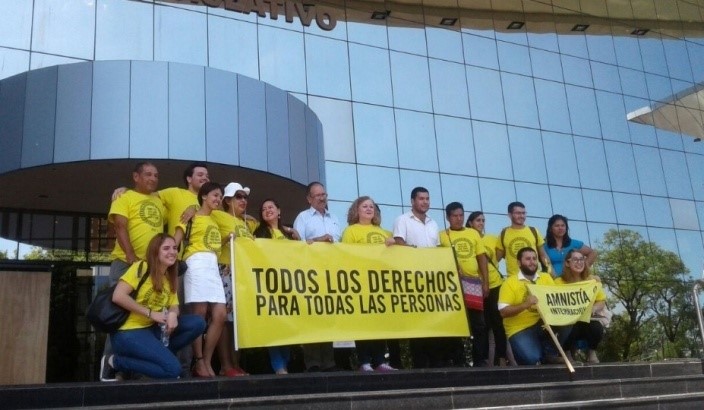
AI Demonstration outside Paraguayan Congress
Amnesty has express grave concern about a bill approved by the Paraguayan Senate which violates the right to freedom of association and could put the country’s civil society organisations at risk, jeopardising their autonomy and their ability to obtain the necessary resources to carry out their human rights defence and promotion activities. The bill will now be considered by the Chamber of Deputies. Were it to approve the bill, Paraguay’s legislative branch would be endorsing highly restrictive conditions for the country’s civil society organisations. Please take Urgent Action here.
VENEZUELA
There have been protests across Venezuela following the announcement on Monday of the disputed result of the presidential election. The National Electoral Council, which features government allies, announced that Nicolas Maduro was the winner earlier this week. The BBC has noted that the announcement “has been widely decried as fraudulent both inside and outside Venezuela”. The opposition has stated that the tallies it had access to show their candidate, Edmundo Gonzalez, as the victor. The military and police have fired tear gas and rubber bullets at some protesters. Opposition leader Maria Corina Machado has called for protests to be peaceful.
Costa Rica’s Foreign Minister, Arnoldo Andre, has said the country is prepared to give political asylum or refuge status to Machado and to Edmundo Gonzalez. Gonzalez had stood as presidential candidate in place of Machado at the election. Maduro had stated that “justice must come” to the opposition leader and to the candidate, stating they were “directly responsible for the criminal violence”.
In the run-up to the election, Amnesty International has called for a commitment to human rights, noting an escalation in repression during the election period. Ana Piquer, Americas Director at Amnesty International, noted that “Venezuela has been through one of the most deplorable periods in its history as regards human rights”. Piquer’s statement notes that the months leading up to the election saw “incessant attacks on civic space, tens of arbitrary detentions, enforced disappearances, torture, reprisals… and arbitrary and abusive administrative measures”. The statement also reiterates Amnesty’s call for the unconditional release of Rocio San Miguel, Javier Tarazona, and Carlos Julio Rojas, who we continue to campaign for.
CHILE
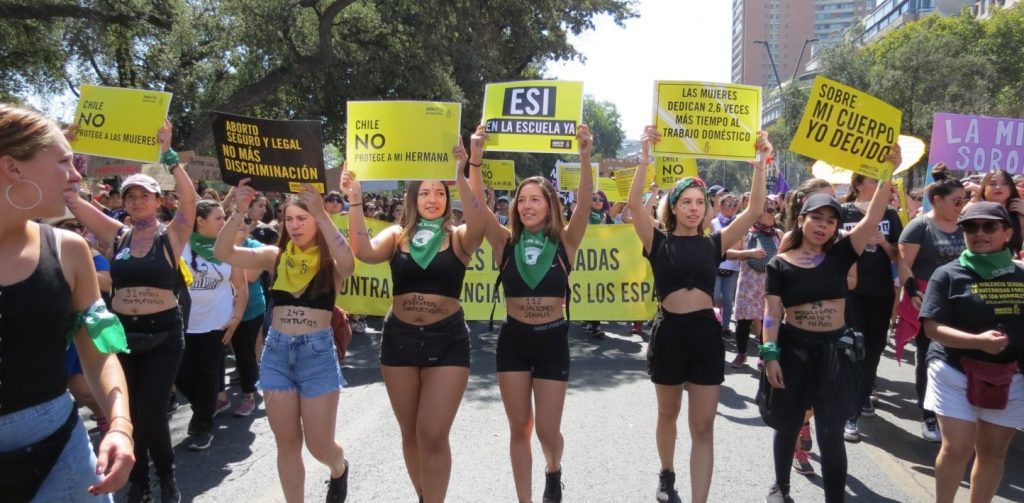
President Gabriel Boric has pledged to introduce a bill that would expand legal abortion in Chile. Amnesty International reiterates that the State must, as soon as possible, decriminalize voluntary abortion in all circumstances and guarantee effective access. Chile’s legal framework only allows exceptions to the criminalization of abortion when the pregnancy puts the life of the pregnant person at risk, when it is the result of rape or due to foetal non-viability. The most recent draft constitution, rejected in a plebiscite last December, would have further tighten these very restrictive abortion laws.
ECUADOR
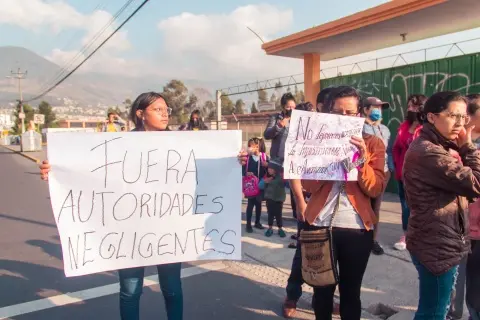 Human Rights Watch have released a new report calling on the Ecuadorian Government to accelerate measures to end sexual violence in schools. According to the report, measures to respond to sexual violence in schools have not progressed at the scale and pace needed to ensure that all children are safe. Despite commitments and measures by government institutions, sexual violence remains endemic in Ecuador’s schools and finding justice is often elusive for survivors.
Human Rights Watch have released a new report calling on the Ecuadorian Government to accelerate measures to end sexual violence in schools. According to the report, measures to respond to sexual violence in schools have not progressed at the scale and pace needed to ensure that all children are safe. Despite commitments and measures by government institutions, sexual violence remains endemic in Ecuador’s schools and finding justice is often elusive for survivors.
BRAZIL
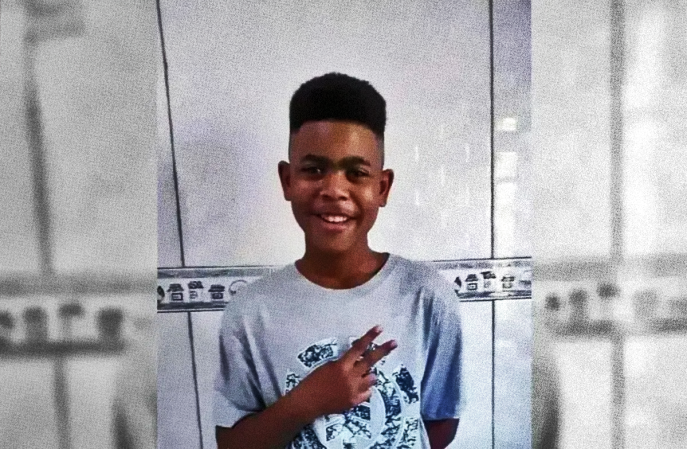
João Pedro Matos (age 14) killed at home by police in Rio de Janeiro in 2020.
Amnesty International ‘is perplexed’ by the decision handed down by Rio State’s Court of Justice to acquit three policemen for the murder of 14-year-old João Pedro Matos. ‘It sends the message that favelas are territories of exception where any death caused by police action will remain unpunished.’ At the time, the house where João was playing with friends was surrounded and shot at by police, according to family members and teenagers who witnessed the crime. After the killing, the victim’s body was flown out on a police helicopter. Over 6,000 people a year are killed by police in Brazil every year.
Protect Defenders EU denounces attacks and threats against leaders and human rights defenders from Onça Quilombo, located in the Médio Mearim region of Maranhão state. Quilombos were formed by fugitive Black slaves. 12 of its leaders have been killed in recent years in disputes over land rights with cattle owners and monoculture farmers. Only six of the 419 Quilombola communities in Maranhão have their title of collective Quilombola territory recognized.
Amazon Watch hosts a blog on the continued threat to indigenous land rights in the Amazon. Despite last year’s landmark decision which allows communities to register historic territories, the Senate’s Constitution and Justice Committee convened to vote on a proposed amendment to the Constitution ‘which seeks to profoundly alter the fundamental land rights of Brazil’s Indigenous peoples’.
OUR TEAM AND YOU
Members of our team remain available to give online or face to face presentations to Local Groups on our countries. Please get in touch if you are interested!
All the best,
South America Team – Richard Crosfield (Colombia and Brazil), David Rogers (Argentina and Chile), James Baird (Venezuela) and Graham Minter (rest of South America). And please don’t forget that you can follow us on our Facebook page and Twitter.
